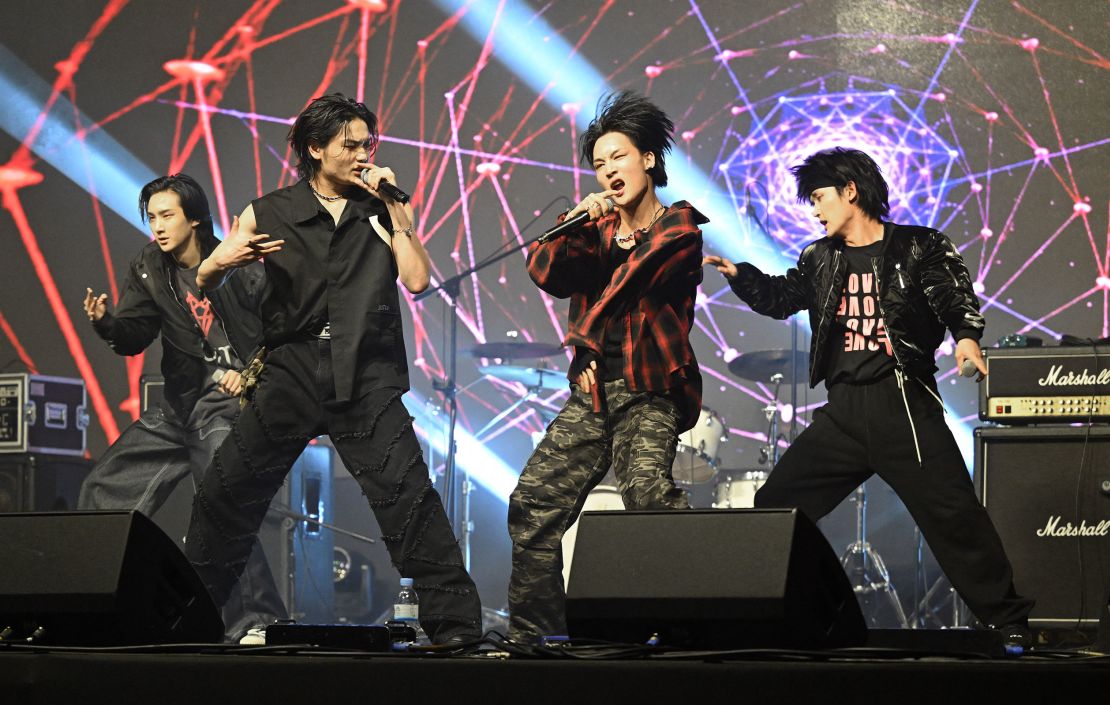Seoul, South Korea
CNN
—
In a quiet corner of Seoul’s Hyuga Cafe, a warm, honey-toned space nestled inside what once served as the dormitory for K-pop megaband BTS, two young men sip iced americanos, sketching out their own dreams of superstardom.
A table away, tourists murmur over lattes, unaware that they’re seated beside what a new record label hopes will be the next big thing in K-pop.
Seok and Hyuk, members of the newly debuted group 1VERSE (spoken as “universe”), are modest in demeanor, almost reluctant to speak of themselves as anything more than trainees with a shot at something bigger. But their stories are unlike any other in K-pop’s history.
They are both North Korean defectors, turned highly trained K-pop dreamers, hoping to follow in the footsteps of K-pop megastars such as BTS and BLACKPINK who have in recent years taken K-pop global, topping US Billboard charts and amassing billion-dollar fan empires.
The 25-year-olds carved paths which speak to the resilience of individual artistry under extraordinary circumstances. As teenagers, both crossed North Korea’s border into China, reuniting with family members who had fled the authoritarian regime of North Korean leader Kim Jong Un.
Both defectors settled in South Korea, and were later discovered and recruited in 2022 by new boutique music label Singing Beetle.
This month, their first album with 1VERSE officially released. The group’s debut international showcase is set for the United States, a move seen by industry observers as both bold and delicate – a new K-pop act launching in one of the world’s most competitive music markets.
Details of 1VERSE’s American performances have yet to be revealed, representatives for Singing Beetle noted. The group consists of five members who reflect K-pop’s global appeal – including Aito from Japan, Kenny from California, and Nathan from Arkansas.
“I never thought I’d be doing music in South Korea,” Seok began, his voice calm but steady. “I liked music when I was in North Korea. I used to write down lyrics of songs I liked, usually about mothers, about longing. I kept those notes. I still look at them sometimes.”
For Hyuk, music arrived later. He came to it not through childhood fascination, but through discovery. “Back in North Korea, I didn’t even have time to listen to music, and I wasn’t in an environment that allowed it either,” he said.
His path changed in a South Korean high school, where a teacher noticed him scribbling lyrics during class. “Why don’t you try rapping?” he recalled his teacher asking.
Hyuk joined a school rap club, wrote his first verses, and performed at a festival. The experience shifted his thinking. Music went from a private curiosity to a public pursuit. Then came a conversation with Singing Beetle’s CEO, Michelle Cho. She promised to help transform his hobby into a dream.
“I began learning step by step,” Hyuk reflected. “And began to dream of becoming an idol,” the term bestowed upon K-pop celebrities.
<div data-uri="cms.cnn.com/_components/video-resource/instances/cmd773tjf00013b6mvdoe7iuj@published" data-component-name="video-resource" data-editable="settings" class="video-resource" data-fixed-ratio="16×9" data-canonical-url-path="" data-parent-uri="cms.cnn.com/_components/video-resource/instances/cmd01hcks000z3b6jkim6jg3f@published" data-video-id="meb0d2c6ead08827e81ccfb7040f394d5112c97bfb" data-media-id="meb0d2c6ead08827e81ccfb7040f394d5112c97bfb" data-bolt-id="583e59bc-45bc-5949-a32b-24a01b5092c5" data-live="" data-analytics-aggregate-events="true" data-custom-experience="" data-asset-type="hlsTs" data-auth-type="none" data-content-type="mediasource-clip" data-medium-env="" data-autostart="disabled" data-show-ads="true" data-source="CNN" data-featured-video="true" data-headline="Meet the K-pop stars from North Korea" data-has-video-player="true" data-description="<p>Hyuk and Seok fled North Korea separately as teenagers. Now, after intense K-pop training, they are making their debut as members of the boy band 1VERSE. Speaking to CNN at a cafe in Seoul, they share their excitement and their dreams.</p>" data-duration="02:51" data-source-html='<span class="video-resource__source"> – Source:
<a target="_self" href="https://www.cnn.com/" class="video-resource__source-url">CNN</a>
</span>' data-fave-thumbnails='{"big": { "uri": "https://media.cnn.com/api/v1/images/stellar/prod/nkorea-kpop-16×9-1.jpg?c=16×9&q=h_540,w_960,c_fill" }, "small": { "uri": "https://media.cnn.com/api/v1/images/stellar/prod/nkorea-kpop-16×9-1.jpg?c=16×9&q=h_540,w_960,c_fill" } }' data-vr-video="false" data-show-html="” data-byline-html='<div
data-uri=”cms.cnn.com/_components/byline/instances/cmd01hcks00113b6j6zj2iqj7@published”
data-component-name=”byline”
class=”byline vossi-byline”
data-editable=”settings”
>
<div class=”byline__images”>
<a class=”byline__image-link” href=”https://www.cnn.com/profiles/mike-valerio”>
<img height=”100″ width=”100″ class=”byline__image vossi-byline__image” src=”https://media.cnn.com/api/v1/images/stellar/prod/1533550-0043-r-ps2560x1440.jpg?c=16×9&q=h_270,w_480,c_fill/c_thumb,g_face,w_100,h_100″ alt=”Mike Valerio” onerror=”imageLoadError(this)”/>
</a>
</div>
<div class=”byline__names vossi-byline__names”>
By <span class=”byline__name”>Aria Chen</span> and <a class=”byline__link vossi-byline__link” href=https://www.cnn.com/profiles/mike-valerio><span class=”byline__name”>Mike Valerio</span></a>, CNN
</div>
</div>’ data-timestamp-html='<div
class=”timestamp vossi-timestamp”
data-uri=”cms.cnn.com/_components/timestamp/instances/cmd01hcks00123b6jgyjwasb7@published”
data-editable=”settings”
>
Published
9:01 PM EDT, Thu July 17, 2025
</div>’ data-check-event-based-preview=”” data-is-vertical-video-embed=”false” data-network-id=”” data-publish-date=”2025-07-12T09:25:01.789Z” data-video-section=”world” data-canonical-url=”” data-branding-key=”” data-video-slug=”north-korean-defector-kpop-1verse-debut-digvid” data-first-publish-slug=”north-korean-defector-kpop-1verse-debut-digvid” data-video-tags=”” data-breakpoints='{“video-resource–media-extra-large”: 660}’ data-display-video-cover=”true” data-details=””>

Trainees’ K-pop transformation
From a young age, aspiring pop stars in South Korea typically go through a long and intense development period. Trainees follow a rigorous daily schedule that includes lessons in singing, dancing, foreign languages, and “idol etiquette.” They are regularly evaluated, often facing a competitive environment with personnel eliminations and reshuffles.
Both Seok and Hyuk reference their two-and-a-half years of training not with the weariness one might expect after years of intensive choreography and vocal drills, but with affection.
“There were times when I struggled alone,” Seok began. “But when I shared those moments, our members and the staff encouraged me. That support is the most memorable part.”
Like most K-pop acts their days are long. Mornings can begin before sunrise with vocal warm-ups and end with fan interactions. Rehearsals stretch late into the evening.
“I used to be in sports,” Seok said, remembering his earlier dream of becoming a soccer star in North Korea. “Now I’m pursuing something completely new. Starting from zero, going through each stage – that reality itself makes me happy.”
The group’s upcoming release includes a track titled “Shattered,” a moody anthem that builds to a moment of piercing vulnerability. In one climactic section, Seok sings: “Who’s gonna save us now?” Two months ago, he wasn’t sure he could hit the note. Now, he sings it with confidence.
“That line reminded me that sometimes we all need someone’s help,” he said. “I hope the audience can feel that.”
Seen as artists, beyond defectors
1VERSE’s music carries echoes of its members’ past. But it also captures the universality of youth: doubt, hope, love, ambition. Hyuk said the group’s songs are less about individual lines than collective storytelling. “Every song tells one of our stories,” he said. “Our members, our company, me and Seok. To me, the songs themselves are beautiful stories.”
Yet as they consider the paths that brought them here, neither Seok nor Hyuk want to be labeled simply as “North Korean defectors.” The term, while accurate, they say, does not encompass their creative ambitions. Nor does it acknowledge the emotional transformation they’ve undergone since arriving in Seoul, a city only about 50 kilometers (31 miles) from the border with the North, but lightyears away in terms of openness and opportunity.
“I feel like I was reborn after coming to South Korea,” Seok said. “South and North Korea are completely different. That’s why I’m able to dream a new dream here.”
Hyuk added, “Sometimes fans ask, ‘Are you from North Korea?’ That means they liked us without knowing. That feels really meaningful.”
For both artists, the experience of striving for something greater resonates across borders – whether someone is from North Korea or any place where ambition is stifled. At the heart of their music lies a quest not for fame or escape, but for the delicate thrill of becoming something more than what their old lives once allowed them to be.
“There are 30,000 North Korean defectors in South Korea,” Hyuk said. “And there are many others (who aren’t defectors) who haven’t dared to dream yet. If our story gives them courage, then I think that process itself is meaningful.”

Stepping onto the American stage
As they prepare for their US debut, both are aware of the stakes. “We’ve practiced so long,” Hyuk said. “But will fans like it?” That question haunts many idol groups. But for Seok and Hyuk, the stakes feel even higher.
Lee Gyu-tag, a George Mason University Korea global affairs professor who studies pop music, said the challenges for new K-pop acts are profound.
Having members who are North Korean defectors “could help gain attention when they first debut,” Lee offered. “But the reality is that the current K-pop market is heavily influenced by major agencies, and competition is extremely fierce.”
“Storytelling and narrative are important in K-pop and that could be a strength for this group,” Lee continued. “There are still opportunities for smaller agencies to attract overseas fans. But with so many groups out there, simply having excellent performances or strong concepts may not be enough to succeed.”
1VERSE’s strategy has been to cultivate a fanbase, affectionately known as the group’s “Starz,” since the beginning of the five members’ training. The singers interact with followers on Singing Beetle’s app, b.stage, as well as on social media platforms such as TikTok and Instagram. The group has so far reached more than 22 million likes on TikTok, approaching 700,000 followers on the platform.
From Seok and Hyuk’s perspective, each comment, like, and shared clip brings them closer to creating music alongside global artists who shaped their own tastes.
Asked to name a dream collaborator, Hyuk answered first: “Post Malone. I really liked his songs growing up.” He blushed at the mention. “Just thinking about it makes me so excited.”
Seok, after a moment of reflection, named Charlie Puth. “He’s a wonderful musician,” he said. “He’s a genius.”
The journey of both 1VERSE bandmates, from the cloistered world of North Korea to the hypercompetitive arena of K-pop, represents something rare: a story where survival and stardom are not opposites, but parts of the same song.
Starting this summer, the world will hear their debut notes.

